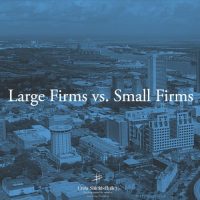Kenny Crow, III, CPA | Supervisor | Published by Crow Shields Bailey
Exploring the Benefits and Challenges of Large vs Small Firms
Throughout my career, I have had the pleasure of working for two successful accounting firms. Both of these have provided me with valuable experiences where I have gained a diverse perspective for the unique benefits of working for different sized public accounting firms.
My first job out of college allowed me to work at one of the largest firms in the southeast that was located in Central Alabama. After working in Birmingham for six and a half years, I decided to move to Mobile, AL in early 2018 and began working at Crow Shields Bailey PC (CSB), a mid-size public accounting firm.
Experience level. One of the main differentiators of working in a large vs. small firm is the pace matched with the level of experience you gain. At the start of your career, joining a smaller firm always helps in rapidly gaining a larger breadth of experience. At a firm like CSB, you get to see jobs from start to finish and truly understand the scope of what you are working on in its entirety. In the larger firms, the work is distributed into smaller chunks between more employees, so the experience you gain is narrowed to one focused area or industry.
Big name clients. Working at the larger-sized accounting firm, I was able to partner with some of the largest private companies in the southeast. Partnering with large clients provided the opportunity to support complex financial statements and face issues that could take CPAs at smaller firms many years to obtain a similar level of experience.
Industry expertise. At larger firms, you tend to get concentrated experience in certain industries and work strictly in either audit or tax. This creates an avenue to become a proficient expert in the areas that you specialize in, but prevents you from being able to comprehensively consult with your clients on all accounting-related matters. At CSB and other similar sized firms, you have the opportunity to gain experience in all types of industries and every line of business. This allows you to be your client’s preferred advisor in tax, audit, financial consulting, forensic accounting, and many other matters.
Path to Partner. With the bifurcation of audit and taxes or industry specializations occurring so frequently in large firms, younger CPAs at major firms may find it more challenging to serve their client in every financial consulting facet as they move towards the path of partner. As younger CPAs at larger accounting firms trend towards industry specialization, they have to invest a significant amount of time to staying updated on industry and accounting literature for areas they lack experience in. CPAs in small firms naturally gain this experience and knowledge more quickly as they progress in their “multiple hat” career paths. Many Baby Boomers and Generation X CPAs that are currently serving in a partner-level position began their careers in an environment where they were involved with all levels of business and worked in several types of industries, similar to CSB.
Leadership opportunities. I have also found that as you progress throughout your career path, you have more opportunities in smaller firms to positively influence the firm’s culture and take on leadership roles, but one can still bring invaluable leadership impact to larger firms if you find the right mentors and support teams.
Regardless of the path of public accounting you choose, you can’t go wrong with a career in this industry. Working at both large and small accounting firms has its benefits and the key to choosing the right one is truly understanding the differences between the two and prioritizing what is important to you. If you have any questions or want any additional information about working at a large accounting firm versus a smaller accounting firm, please contact Kenny Crow, III at [email protected].




